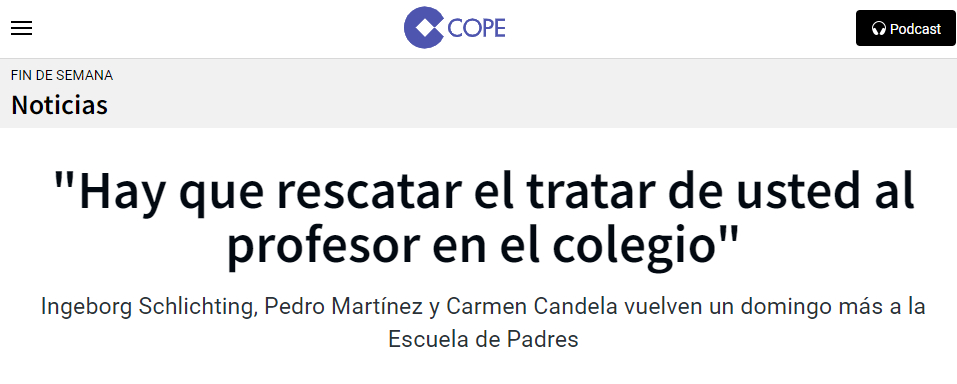It was once common in Spain, but nowadays the formal ‘usted’ (you) form is rarely used besides in some pretty specific situations. So why is the more informal ‘tú’ form becoming ever more dominant among Spaniards?
If you live in Spain or spend time here, you’ve probably heard the word tú (you) a fair bit. It’s one of the very first words you learn when learning Spanish, and pretty crucial (obviously).
But you may have also occasionally heard Spanish speakers using the word usted (also meaning you) from time to time too.
Advertisement
It’s far more likely that you hear tú in Spain, but perhaps if you’ve heard a respectful younger Spaniard talking to an elderly neighbour, or their boss on the phone, or even watched something like a political debate or interview on TV, you probably heard usted used.
Similarly, if you have noticed usted being used while out and about in Spain, it could well have been from the large Latino population in Spain, and it’s likely that you heard Colombians, Venezuelans or other Latinos saying it.
READ ALSO: Why Spain has allowed regional languages to be spoken in Congress
Though they do sometimes use it, the use of usted among Spaniards is slightly different, much rarer, and saved for select circumstances.
In fact, it’s becoming so rare in Spain that some feel its usage is dying out completely, if it hasn’t already.
So, what’s going on here?
Usted vs tú
Firstly, let’s start with a definition. According to the Real Academia Española (RAE) usted is a:
“Form which, in the nominative, in the vocative or preceded by a preposition, designates the person addressed by the speaker or writer… [used] generally as a polite, respectful or distancing address.”
Eg) disculpe, ¿sabe usted dónde está el hospital? (excuse me, do you know where the hospital is?)
In understanding the usted form specifically in Castilian Spanish – Spanish spoken in parts of Latin America it can be slightly or very different, depending where you are – that last part of the definition is key: “generally as a polite, respectful or distancing address.”
It’s worth noting that with usted the verbs are conjugated as if they were third-person singular (el as in he or ella as in she), so it’s usted sabe instead of tú sabes.
Advertisement
Usted is a form used to show respect or seniority: that you understand there’s a hierarchy (in which usted is at the top, so for example when speaking to your boss or someone interviewing you for a job), but also occasionally to mark social distance between two people (because tú could be considered overly friendly in certain situations) and then, finally, it’s also used more generally to show respect in terms of seniority, like when speaking to an elderly person.
https://www.youtube.com/watch?v=3oi5dZNUdAc
Tú vs usted in Spain
Respectfulness is the key word here. In short, if you hear usted used in Spain, it’s probably for a reason.
In Spain, usted is generally only ever used with authority figures, the elderly and in some formal and/or professional settings, but many Spaniards will just skip over it and use the tú form. Tú can be used with everyone else: your friends, partners, neighbours (around your age or younger), siblings, co-workers, kids, and other people you don’t know but are roughly your age or younger.
In fact, in some cases people might actually be offended if you use the usted form because you could be implying that they’re old, a mistake or social faux pas that is somewhat similar to calling a woman señora and then being quickly corrected (usually with a scornful look) that is should be señorita.
In such cases, they may say trátame de tú (treat me as ‘less formal’ you) or me puedes tutear.
The verb tutear actually means to speak to someone using the more informal tú form.
The only part of Spain where the plural form of usted – ustedes – is used all the time is the Canary Islands and some parts of southern Andalusia, where locals prefer this form instead of the standard Castillian vosotros (you in plural). That doesn’t mean that they say usted instead of tú in the singular form, this exception only applies to the plural.
Do people actually use the formal usted form anymore in Spain?
Less and less. It’s dying out in Spain, has been for a while, and is now reserved for those rare occasions outlined above. It’s thought by linguistic experts that it began dying out in the 1970s and 1980s.
The use of usted in Castillian Spanish is now very rarely used in casual conversation. In many cases can only be heard in very formal or ceremonial settings, such as in judiciary, the army, or in certain academic culture contexts or events.
In day to day life, usted only really shows up (besides the examples given above) in advertising, something that generally needs to reflect cultural attitudes and keep up with modern day parlance, so now only really uses the usted form in some specific campaigns for financial services or medical products. As such, depending on the context and age of the people involved, you could also hear usted in spoken Spanish in banks and doctors or hospitals.
Advertisement
An article in Spanish newspaper La Vanguardia entitled ‘Usted is dying’ published back in 2012 looked into the disappearance of the formal form in detail. The fact it was published over a decade ago means that, if anything, the trends it discusses have deepened since then and usted is even lesser used than it was then.
“The use of usted has been reserved for very formal campaigns where a kind of protocol respect for the interlocutor is maintained,” Josep Maria Ferrara, founder and creative director of the Paulov advertising agency, told La Vanguardia.
But this was not the case twenty or thirty years ago. A study on the use of tú and usted in advertising at the end of the 1980s showed that the usted form was used for the most part and that only 11 percent of the advertisements analysed used the tú form.
Advertisement
Changing world, changing language?
So, what changed? Secundino Valladares, professor of Anthropology at the Madrid’s Complutense University, says that Spaniards have embraced tú to such an extent “that the phenomenon is now unstoppable; young people, educated in ‘tuteo’ [the use of the tú form] are sweeping to victory with the tú, and as society is dominated by the value of youth… many older people feel flattered if you tú them,” he said.
In Spain in the 1940s and 1950s the usted form was still well established in many parent-child relationships, and in teacher-student relationships until well into the 1970s. But a changing world and progressive, more egalitarian political ideas seems to be partly responsible for the change. Of course, in Spain, this linguistic shift may have something to do with the changing power and interpersonal dynamics of Spanish society as it transitioned from dictatorship to democracy around this time.

Headline by Spanish radio station Cope reads “Speaking to the teacher at school with the usted form must be brought back”.
Sociologist Antonio López pointed to this trend: “The tendency towards a more egalitarian society, towards the loss of hierarchical distances in social relations, means that it does not seem right to establish prior distances and that is why tú is used instead of usted, which for many denotes distance.”
In that sense, the decline in the formal usted form can be understood both in terms of the laid back nature of Castilian Spanish compared with countries in Latin America, but also in terms of language reflecting social change, similarly to how today, in modern day Spain, there is debate over the use of inclusive language and the dominance of the masculine form in Spanish grammar.
READ ALSO: What is Spain’s inclusive language debate and why is it so controversial?









